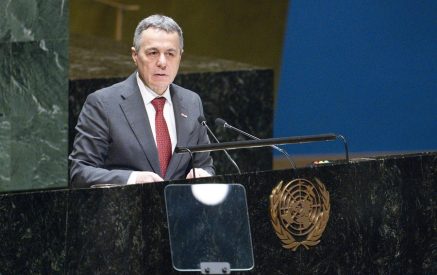LEINSWEILER, 8 May 2017 – An OSCE Parliamentary Assembly seminar held this weekend in Leinsweiler, Germany, focused on the question of how the renewed competition for geopolitical spheres of influence is impacting security in the OSCE area. Hosted by the German Delegation to the OSCE PA, the seminar addressed specific themes related to collective security, economic co-operation and the effects of geopolitical competition on the societies of countries involved.
OSCE PA President Christine Muttonen opened the seminar on Saturday noting that new tensions have arisen in the OSCE’s recent past that threaten to erode safeguards in place to prevent major conflicts.
“Over the course of nearly two centuries European history culminated in two devastating world wars, destroying the continent and causing tremendous suffering with millions of deaths,” she said. “It seems, unfortunately, that the lessons that this history should have taught us are being forgotten by more and more people, including the highest-level of decision-makers.”
Muttonen regretted that in recent years, there has been a tendency across the OSCE area to move away from co-operative decision-making and that powers are interfering outside their borders in attempts to establish spheres of influence. “This trend also undermines efforts to peacefully resolve conflicts,” she pointed out.
Read also
In her opening remarks, OSCE PA Treasurer and Head of the German Delegation Doris Barnett stressed the danger to peace and security posed by the “renationalization of politics” taking place across the OSCE area, and noted the importance of inter-parliamentary dialogue in promoting solutions to ongoing problems.
“Parliamentary democracy is not just a pastime, but a hard piece of work on the path to a more peaceful world,” Barnett said. “With this, we also support our governments in their ongoing efforts.”
Bringing together 22 Members of Parliament from 13 countries, the Leinsweiler seminar also included the participation German parliamentarians representing Southern Palatinate and Rhineland-Palatinate, and representatives from the OSCE’s governmental side and executive structures, as well as other European institutions.
Deputy OSCE Co-ordinator for Economic and Environmental Affairs Ralf Ernst and Morten Jung of the Western Balkans Directorate of the EU Commission spoke at the session on economic co-operation, while OSCE Conflict Prevention Centre Director Amb. Marcel Pesko addressed the session dealing with impacts on collective security concepts and established security mechanisms.
Sessions were chaired by Office for Democratic Institutions and Human Rights Michael Georg Link, OSCE PA Vice-President Kent Harstedt (MP, Sweden), Rapporteur for the OSCE PA’s Committee on Political Affairs and Security Margareta Cederfelt (MP, Sweden), and Chair of the OSCE PA’s Parliamentary Team on Moldova Arta Dade (MP, Albania).
The seminar, entitled “Renationalization of politics and the fight for geopolitical spheres of influences: Endangering Peace and Security,” was the third of a series of OSCE PA seminars held in the French-German border region of Leinsweiler, following events in March 2015 and April 2016 dedicated to considering parliamentary contributions to OSCE efforts in addressing conflicts.

























































